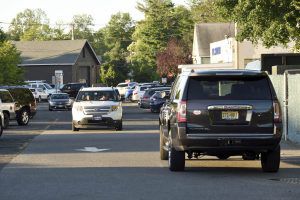I live on Maple Street and believe it exemplifies the best of Princeton, where tree-lined neighborhoods nurture a safe, friendly and diverse community that cultivates spontaneous interactions, and where one can walk within minutes to locally owned restaurants, cafes, food shops, as well as a huge variety of university activities.
However, as Princeton returns to pre-pandemic days, tree street residents return to the difficult task of finding daytime on-street parking. The fundamental problem is that some tree streets have unregulated daytime parking and are thus home to free parking for university employees and students, business employees and customers, in addition to residents and visitors.
The Princeton Permit Parking Task Force (TF) has studied town parking since June 2019 and it has incorporated data from the 2017 Nelson/Nygard report. TF deliberations have been extensive, with views and needs examined across a broad spectrum of town interests. It is unlikely that any proposed solution will perfectly satisfy every scenario and constituent, nor will a single solution work for every neighborhood.
With these points in mind, the proposal (available at www.princetonnj.gov/329/Permit-Parking-Task-Force) aims for equity across the concerns of residents and merchants. I am particularly hopeful that the proposal’s recommendations will relieve the excessive daytime parking burden now carried by the tree streets as well as the Witherspoon-Jackson neighborhoods.
Facets of the proposal with particular relevance to the tree streets include the following: Daytime unpermitted parking will be limited to three hours, thus eliminating the all-day unregulated parking that currently limits availability and turnover. Residents without driveways will be able to purchase 24/7 permits. There will be no permits provided to non-resident university employees or students. Resident and visitor permits will be registered to a license plate and available online anytime. Alternatively, car stickers will be available for purchase at Town Hall. Notably, a resident parking permit does not guarantee a specified on-street parking spot, so a permit holds no real estate value.
Local employers will be able to purchase permits to be shared among their employees for parking on a block-by-block basis, with employee permits not to exceed roughly 40% of the available spots on any particular block. The Spring Street garage is part of the solution for employees and customers throughout the town. However, since it is commonly 90% full in the daytime (see Nelson/Nygard report), the garage complements rather than replaces on-street employee parking.
In deliberating on these matters, the TF has coalesced around the vision of a Princeton whose diverse residents and merchants collaborate to realize an equitable parking solution that supports a beautiful and vibrant town. Anyone interested in town parking is encouraged to read the proposal for more details and to offer feedback. https://www.princetonnj.gov/329/Permit-Parking-Task-Force
Stephen Griffies
Princeton Permit Parking Task Force member
Princeton

